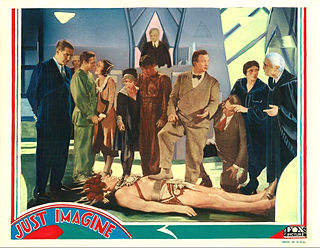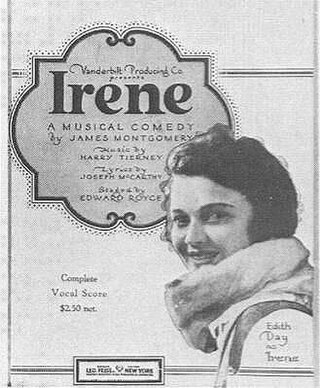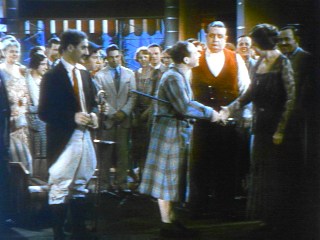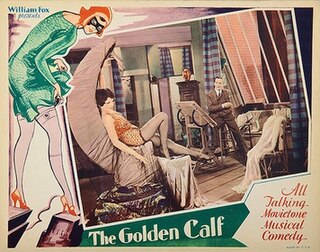The Fox Film Corporation was an American independent film production studio formed by William Fox (1879–1952) in 1915, by combining his earlier Greater New York Film Rental Company and Box Office Attraction Company.
Movietone News was a newsreel that ran from 1928 to 1963 in the United States. Under the name British Movietone News, it also ran in the United Kingdom from 1929 to 1986, in France also produced by Fox-Europa, in Australia and New Zealand until 1970, and Germany as Fox Tönende Wochenschau. An Indian version called Indian Movietone News ran in 1942 and 1943 before getting replaced by Indian News Parade.
Stephen Goosson was an American film set designer and art director.

A revue is a type of multi-act popular theatrical entertainment that combines music, dance, and sketches. The revue has its roots in 19th century popular entertainment and melodrama but grew into a substantial cultural presence of its own during its golden years from 1916 to 1932. Though most famous for their visual spectacle, revues frequently satirized contemporary figures, news or literature. Similar to the related subforms of operetta and musical theatre, the revue art form brings together music, dance and sketches to create a compelling show. In contrast to these, however, revue does not have an overarching storyline. Rather, a general theme serves as the motto for a loosely related series of acts that alternate between solo performances and dance ensembles.

Just Imagine is a 1930 American pre-Code science fiction musical-comedy film, directed by David Butler. The film is known for its art direction and special effects in its portrayal of New York City in an imagined 1980. Just Imagine stars El Brendel, Maureen O'Sullivan, John Garrick and Marjorie White. The "man from 1930" was played by El Brendel, an ethnic vaudeville comedian of a forgotten type: the Swedish immigrant.
70 mm Grandeur film, also called Fox Grandeur or Grandeur 70, is a 70 mm widescreen film format developed by William Fox through his Fox Film and Fox-Case corporations and used commercially on a small but successful scale in 1929–30.

Thomas Joseph McCarthy was an American lyricist whose most famous songs include "You Made Me Love You", and "I'm Always Chasing Rainbows", from the now-forgotten Oh, Look! (1918), starring the Dolly Sisters, based upon the haunting melody from the middle section of Chopin's Fantaisie-Impromptu.

Multicolor is a subtractive two-color motion picture process. Multicolor, introduced to the motion picture industry in 1929, was based on the earlier Prizma Color process, and was the forerunner of Cinecolor.

Elmer Goodfellow "El" Brendel was an American vaudeville comedian turned movie star, best remembered for his dialect routine as a Swedish immigrant. His biggest role was as "Single-0" in the sci-fi musical Just Imagine (1930), produced by Fox Film Corporation. His screen name was pronounced "El Bren-DEL".

Happy Days is a 1929 American pre-Code musical film directed by Benjamin Stoloff, which was the first feature film shown entirely in widescreen anywhere in the world, filmed using the Fox Grandeur 70 mm process. French director Abel Gance's Napoléon (1927) had a final widescreen segment in what Gance called Polyvision. Paramount released Old Ironsides (1927), with two sequences in a widescreen process called "Magnascope", while MGM released Trail of '98 (1928) in a widescreen process called "Fanthom Screen".

Marjorie White was a Canadian-born actress of stage and film.

Sunny Side Up is a 1929 American pre-Code Fox Movietone musical film starring Janet Gaynor and Charles Farrell, with original songs, story, and dialogue by B. G. DeSylva, Lew Brown and Ray Henderson. The romantic comedy/musical premiered on October 3, 1929, at the Gaiety Theatre in New York City. The film was directed by David Butler, had (now-lost) Multicolor sequences, and a running time of 121 minutes.

Fox Movietone Follies of 1929, also known as Movietone Follies of 1929 and The William Fox Movietone Follies of 1929, is an American black-and-white and color pre-Code musical film released by Fox Film Corporation.
A widescreen aspect ratio was first seen in a movie in Paramount's Old Ironsides of 1926. A few years later in 1928 and '29, a fad broke out for such special features as widescreen and color. Color was the more common choice, being that it was projected the same as black and white while theaters needed wider screens and special lenses for their projectors to show widescreen movies. With the lack of a standard for widescreen aspect ratios, studios had to go to the expense of filming several versions of a widescreen movie to cover the more common kinds of projector lens. The first movie to combine the two was Fox Movietone Follies of 1929, widescreen and partially in color. The next year, there were two, Song of the Flame and Kismet, which are today both lost films. By late 1930, however, most of the planned widescreen movies were shelved as studios began to feel the effects of The Great Depression and were forced to economize.
New Year's Eve is a lost 1929 sound film drama produced and distributed by Fox Film Corporation and starring Mary Astor and Charles Morton. While the film has no audible dialog, it was released with a synchronized musical score with sound effects using the sound-on-film movietone process. Veteran Henry Lehrman, who had worked with Mack Sennett and Charlie Chaplin, was the director. Samuel L. Rothafel wrote the music for film. As was the case for the majority of films during the early sound era, a silent version was prepared for theatres who had not yet converted to sound. Max Gold was an assistant director.

Noel Francis was an American actress of the stage and screen during the 1920s and 1930s. Born in Texas, she began her acting career on the Broadway stage in the mid-1920s, before moving to Hollywood at the beginning of the sound film era.

The Golden Calf is a 1930 American pre-Code musical comedy film directed by Millard Webb and written by Marion Orth and Harold R. Atteridge. The film stars Jack Mulhall, Sue Carol, El Brendel, Marjorie White, Richard Keene and Paul Page. The film was released on March 16, 1930, by Fox Film Corporation.
Homesick is a 1928 American synchronized sound comedy film directed by Henry Lehrman and written by John Stone and William Kernell. While the film has no audible dialog, it was released with a synchronized musical score with sound effects using the sound-on-film movietone process. The film stars Sammy Cohen, Harry Sweet, Marjorie Beebe, Henry Armetta, and Pat Harmon. The film was released on December 16, 1928, by Fox Film Corporation.

Lola Lane was an American actress and one of the Lane Sisters with her sisters Leota, Rosemary, and Priscilla Lane. She appeared on Broadway and in films from the 1920s to 1940s.













